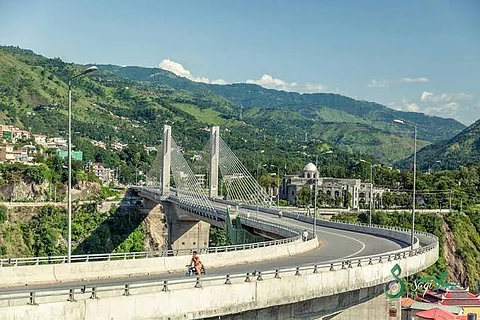

The world watched a striking image unfold on July 14, 2025: Omar Abdullah, chief minister of Indian-administered Jammu and Kashmir, scaling a boundary wall to enter the Martyrs’ Graveyard in Srinagar, a day after being kept under house arrest.
His action, in defiance of restrictions, was a powerful statement of respect for the 22 Kashmiris, who fell to bullets on July 13, 1931, while protesting outside Srinagar Central Jail.
One would have expected that across the Line of Control (LoC), in Pakistan-administered Jammu and Kashmir (PaJK), the day would be observed with greater fanfare and solemnity—especially in a region where the legacy of 1931 has been central to its post-Partition identity.
Instead, what transpired was a subdued affair. Though official ceremonies were held at the district level and a formal message was released, Prime Minister Chaudhry Anwar-ul-Haq’s decision to skip all commemorative events in person sparked widespread disappointment.
The omission was particularly glaring given the precedent set in 2020, when the PaJK government formally declared July 13 a state protocol day. That year, even amid the COVID-19 lockdown, then-Prime Minister Raja Farooq Haider laid a floral wreath at a symbolic martyrs' memorial, and a ceremonial police guard offered a salute.
Haider, in conversation with Kashmir Times, did not hold back his criticism of the current leadership.
“We introduced the official notification in 2020 as a response to India’s abrogation of Article 370 and its attempt to erase Kashmir’s distinct identity,” he said. “We wanted to assert that history cannot be rewritten—and that we will remember the sacrifices made for freedom and faith, no matter the circumstances.”
Haider lamented that while a chief minister in Srinagar defied restrictions to honor the martyrs, the PaJK prime minister confined his commemoration to a press release. “If a political party were in power today, this day would have been marked with the dignity it deserves. But since Mr Anwar-ul-Haq is not affiliated with any political party, he doesn’t feel the weight of our historical responsibility,” he remarked.
Shrinking democratic space
The July 13 martyrs’ story is etched in Kashmir’s collective consciousness. In 1931, 22 young men were shot dead one after another while attempting to complete the adhan (call to prayer) outside Srinagar Jail. They died facing the bullets, not turning their backs. Their courage became a cornerstone of the region’s political awakening against autocratic rule.
In his written statement this year, Prime Minister Anwar-ul-Haq acknowledged the martyrs' sacrifice, calling July 13 a “milestone in Kashmir’s freedom struggle.” He reiterated that their courage would not go in vain, asserting that Kashmir would one day be free from Indian rule and “the green crescent flag would fly in Srinagar.”
But for many, words were not enough.
Retired Chief Justice Manzoor Hussain Gilani, who spent his youth in Srinagar, recalled how schools, colleges, and government offices once marked July 13 with solemnity and pride.
“After moving to PaJK, I was heartened to see the same enthusiasm here. Since Modi took office in 2014, efforts have intensified to erase this history across the Line of Control. That makes it even more important for us to remember,” he said.
This year’s muted observance came amid a heated regional discourse on civil liberties and state power. Omar Abdullah’s wall-scaling was followed by a sharp criticism of local media for ignoring the event, and a critical tweet by West Bengal Chief Minister Mamata Banerjee against the Indian government’s tactics. These developments sparked debate on both sides of the Line of Control over shrinking democratic space and increasing state overreach.
On social media, ordinary citizens in PaJK expressed unease at the situation in Indian-administered Kashmir since August 2019. Where once Indian democracy was occasionally held up as a comparative model, now there is growing skepticism and criticism. Many users drew comparisons between pre- and post-2019 Kashmir, mourning the loss of political agency, identity, and historical memory.
The legacy of July 13 is not just about mourning the dead; it is about honouring their spirit by upholding truth, justice, and memory. Whether that legacy continues to inspire officialdom in PaJK remains an open question. But among the people, at least, the memory lives on.
Have you liked the news article?